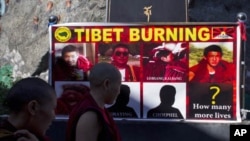A Tibetan exile is recovering after setting himself on fire in front of the Chinese embassy in the Indian capital. His attempt is the latest in a series of self-immolation protests against Chinese polices in Tibet.
Sherab TseDor, 25, posted a message on the social media site Facebook Friday stating his intent to immolate himself in front of the Chinese Embassy in the Indian capital, and thereby join fellow Tibetans he called "the 11 martyrs."
"We are dying," his note continues, "and it's [the] moral responsibility of every freedom loving people to support us."
Indian police were able to put out the flames Friday morning after Sherab set his lower body ablaze -- leaving him with burns on his legs.
Recent self-immolations in Chinese-controlled Tibet have added a note of urgency to the decades-old complaint by Tibetan exiles that China is systematically dismantling the region's traditional Buddhist culture.
The focus of the protest suicides has been a crackdown on a Tibetan monastery which Chinese forces have isolated since March, after another protest self-immolation by a monk there. Tibetans say China forces monks there to undergo "patriotic re-education" which undermines their religious teaching.
In southwest China, at least 11 ethnic Tibetans have set themselves on fire in recent months, demanding greater religious and cultural freedom.
Chinese Foreign Ministry Spokesman Hong Lei said Friday that Beijing views the suicides as immoral.
He says except for a few cults and extremist faiths, all of the world's religions maintain full respect for life and oppose violence. They condemn self immolation, he says, not play it up and then incite others to follow their example. To do so, says Hong, challenges the common conscience and moral bottom line of humanity.
Tibetan activists say the immolations are a reflection of the desperate situation inside Tibet. Konchok, with the Tibetan Youth Congress, says such measures do not violate Buddhism.
"Self-immolations [are] not against the Buddhism principle. To hurt [and] harm others are against Buddhism principle. So to sacrifice oneself is not against Buddhist principle," Konchok said.
India hosts the Tibetan exile community and its spiritual leader, the Dalai Lama -- whom China has labelled a dangerous separatist and a "terrorist in disguise." The Dalai Lama says he is seeking autonomy, not independence, for Tibet.
Media access to Sherab after his immolation attempt was strictly curtailed in the Indian government-run hospital where he is recovering.




